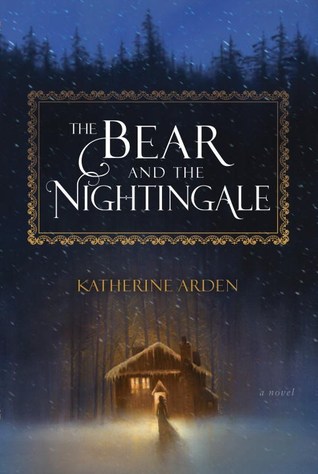The Bear and the Nightingale (The Bear and the Nightingale #1)
by Katherine Arden.
 Vasilisa, the youngest of 5 siblings, grows up in the Russian hinterlands with a special connection to the wild. She loves her nurse’s stories of the different spirits of house and forest, but most of all she loves tales of Morozko, the fearful king of winter. When her father remarries to a devout citywoman, who comes with a new priest, it triggers a change in Vasilisa’s comfortable existence. And, as she soon comes to realize, a change in the natural balance. As the new priest’s influence grows, the local spirits and land weaken. As scary as tales of Morozko are, they are nothing compared to the thing he guards against. Threatened with marriage or a convent by her stepmother, Vasilisa must find a way to keep her land and people safe before time runs out.
Vasilisa, the youngest of 5 siblings, grows up in the Russian hinterlands with a special connection to the wild. She loves her nurse’s stories of the different spirits of house and forest, but most of all she loves tales of Morozko, the fearful king of winter. When her father remarries to a devout citywoman, who comes with a new priest, it triggers a change in Vasilisa’s comfortable existence. And, as she soon comes to realize, a change in the natural balance. As the new priest’s influence grows, the local spirits and land weaken. As scary as tales of Morozko are, they are nothing compared to the thing he guards against. Threatened with marriage or a convent by her stepmother, Vasilisa must find a way to keep her land and people safe before time runs out.
One of my favorite books growing up was this book of Russian fairytales. In many ways, The Bear and the Nightingale was like revisiting my childhood. Except the fairytale grew up with me and got equivalently darker as a result. I’m not mad about it. This was an engrossing, atmospheric read. From the domestic spirits to the encroachment of Christianity to the mythos surrounding Morozko, this fictional slice of old Russia felt rich and authentic. It is not a Disney-fied fairytale. There is blood and death and violence, and a monster or five. It does nicely capture that feeling familiar from folk tales, where reality slips sideways just a bit and suddenly things like magic just are.
Vasilisa as the main character is both traditional and not. Traditional because that’s a recurring name/character from Russian folklore, but not because generally it’s Vasilisa the Beautiful where she is a fair maiden. This story’s Vasilisa is not ugly, but not beautiful either. Rather, she is smart, and brave, and compelling. I like this modern twist on a heroine. The supporting characters were mostly well-done and sympathetic- even the traditionally vile stepmother. The author did well to add nuance to the normal archetypes.
I would’ve liked a little more backstory on Vasilisa’s mother and the magic of her line (where it came from, what exactly that meant). And some parts of the story moved a little slowly for me. But overall, I still really enjoyed this book.
If you like new twists on old stories, or have a penchant for Russian folklore, give this a try.
I give it 4/5 stars.
I received a free advanced copy of this book from NetGalley in exchange for an honest review.
![]()










